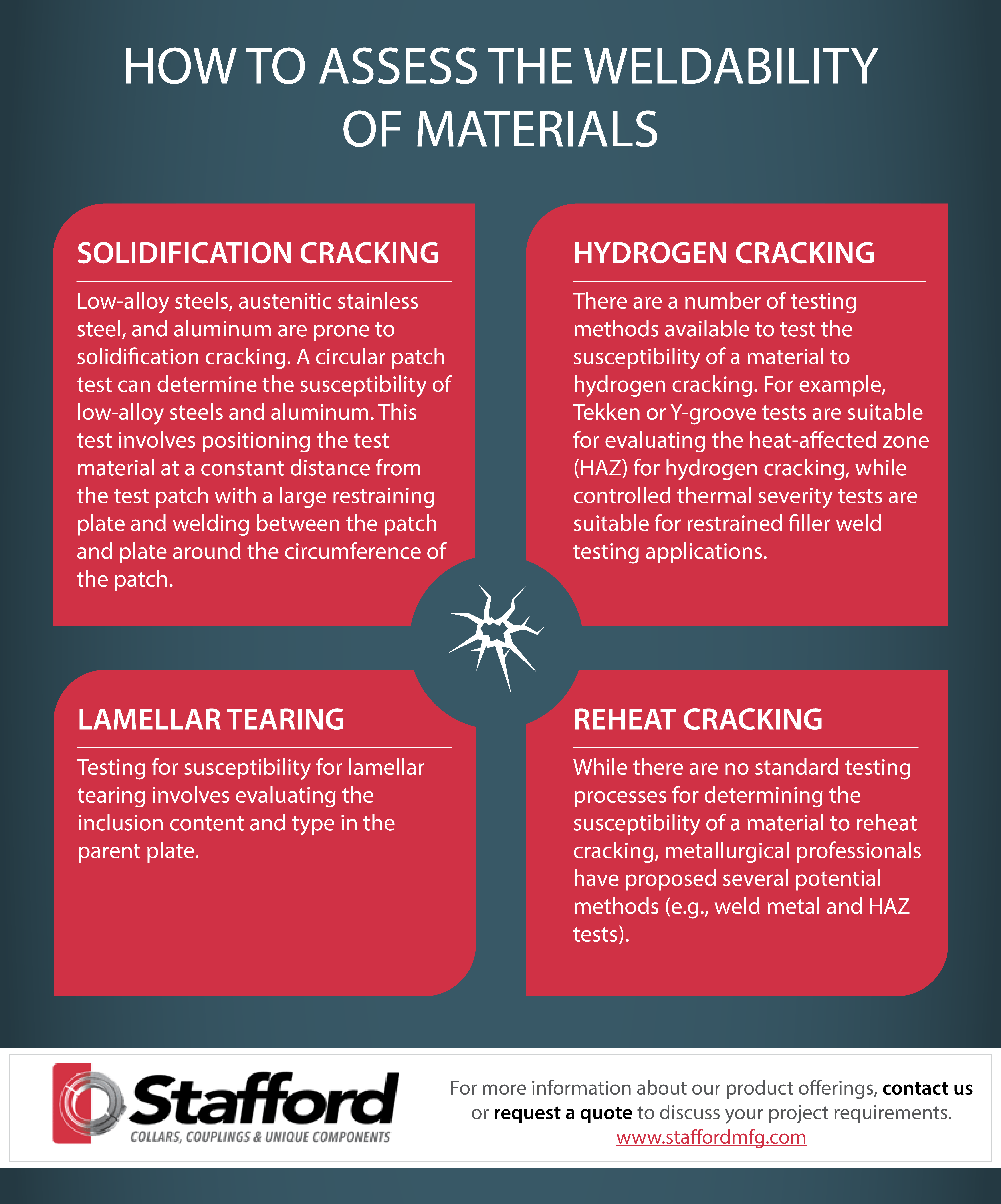Weldability
At Stafford Manufacturing Corp., we produce premium quality shaft collars, rigid couplings, coupling adapters, and other mechanical components used in motion control, power transmission, mounting, and clamping applications. One of the common inquiries we receive from customers is regarding the weldability of our products. The following article discusses some basic things to consider when looking to weld your shaft collar or coupling.
Weldability of Materials
Our products are made from a variety of metallic and non-metallic materials, including:
- Aluminum
- Steel (1018, 1117, 1215 & C1026)
- Stainless steel (303 & 316L)
- Nylon 6/6
- Delrin®
- Acetal resin
- ABS
- PTFE
Regarding metallic materials, we recommend that only the standard products made from AISI 1018 steel, C1026 steel, or 316 stainless steel be welded to protect the integrity of the part and the safety of workers. There are many reasons for this recommendation, which vary depending on the material in question. For example:
- Certain mild steel alloys used to manufacture high-strength, low-cost components contain lead. In its solid state, lead does not pose a health threat to workers. However, when it is subjected to welding, it may produce toxic fumes.
- Similar to mild steel alloys, some plating materials, such as chrome and zinc, generate hazardous fumes during welding operations.
- 303 Stainless steel contains sulfur, which improves the machinability of the material but reduces its weldability.
- Aluminum exhibits many properties that make it difficult to weld even by highly experienced professionals.
For non-metallic materials, specialized welding techniques are required. For example:
- Dielectric, spin, ultrasonic, and vibration welding are suitable for nylon.
- Hot gas, hot wire, and spin welding are suitable for acetal.
- Hot pressure and hot air welding are suitable for PTFE.
How to Assess the Weldability of Materials
According to the American Welding Society (AWS), weldability refers to the capacity of a material to undergo fabrication operations and result in structures that meet the intended design specifications and performance requirements. There are many factors that affect the weldability of a material. The primary one is the material’s susceptibility to cracking.
Many metals are prone to cracking and tearing when subjected to welding operations. Testing procedures are available to determine and/or verify their susceptibility to this weakening.
- Solidification cracking. Low-alloy steels, austenitic stainless steel, and aluminum are prone to solidification cracking. A circular patch test can determine the susceptibility of low-alloy steels and aluminum. This test involves positioning the test material at a constant distance from the test patch with a large restraining plate and welding between the patch and plate around the circumference of the patch. The susceptibility of aluminum can be determined by the Houldcroft fishbone test, which involves slots of increasing length machined into the test area.
- Hydrogen cracking. There are a number of testing methods available to test the susceptibility of a material to hydrogen cracking. For example, Tekken or Y-groove tests are suitable for evaluating the heat-affected zone (HAZ) for hydrogen cracking, while controlled thermal severity tests are suitable for restrained filler weld testing applications.
- Lamellar tearing. Testing for susceptibility for lamellar tearing involves evaluating the inclusion content and type in the parent plate.
- Reheat cracking. While there are no standard testing processes for determining the susceptibility of a material to reheat cracking, metallurgical professionals have proposed several potential methods (e.g., weld metal and HAZ tests)
In addition to the inherent weldability of material, the final quality of a weld assembly is dependent on the welder. The welder must have the knowledge and skills to perform the welding operation correctly.
Contact the Experts at Stafford Manufacturing Today
Stafford Manufacturing is an ISO 9001:2015 company that specializes in the manufacture and distribution of shaft collars, rigid shaft couplings, and other products for power transmission, motion control, automation, and other OEM and MRO applications. Equipped with over 45 years of experience, our team can produce standard and custom products that accommodate virtually any customer specifications. If a weldable part is required and is not available among our standard product offerings, we are happy to manufacture your special design from a weldable material with the desired part features.
For additional information about weldability and how we utilize this knowledge when designing and manufacturing our products, contact us today.




